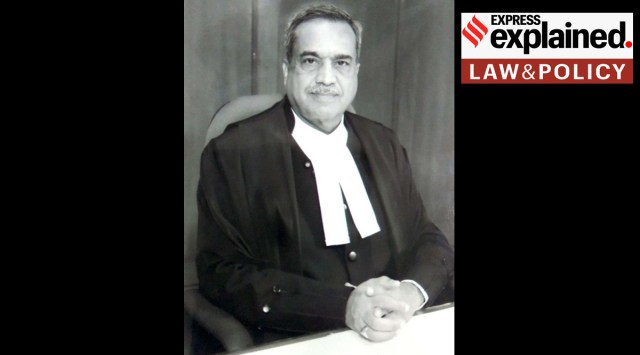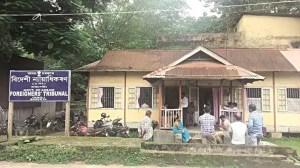Justice MR Shah retires: A look at key verdicts, orders he delivered
Justice MR Shah retired from the Supreme Court on May 15. In his time at the apex court, Justice Shah has overseen multiple high-profile cases.
 Justice MR Shah will retire today. (File)
Justice MR Shah will retire today. (File) A day after his fellow judge Justice Dinesh Maheshwari’s retirement, Supreme Court judge Justice M R Shah retired on Monday (May 15).
In an apex court tenure spanning four years, Shah delivered close to 712 judgments and was part of eight Constitution Benches. Only last week, he was part of the Constitution Bench that decided on the tussle between the Delhi government and the Centre on the issue of control over the bureaucracy in Delhi, followed by the dispute between the warring factions of the Shiv Sena.
Here is a look at some of the key judgments and orders delivered by him:
- 01
Ravikumar Dhansukhlal Maheta & Anr versus High Court of Gujarat & others (2023)
On May 12, a bench of Justices MR Shah and CT Ravikumar, in an interim order, stayed the Gujarat High Court's decision to promote 68 judicial officers as district judges while a plea challenging it was pending before the court.
The plea filed by two judicial officers of the senior civil judge cadre in Gujarat contended that according to the recruitment rules, posts of district judges were filled by reserving 65% of the seats on a merit-cum-seniority basis and the candidates clearing a suitability test, however, the merit-cum-seniority principle was given a "go-by" and the appointments were made based on the seniority-cum-merit principle instead.
This meant that despite scoring higher marks than the selected candidates, the petitioners were not appointed.
- 02
Arup Bhuyan versus State of Assam & Anr (2023)
On March 24, the top court upheld the validity of Section 10 (a)(i) of the Unlawful Activities (Prevention) Act, 1967 (UAPA) to say that mere membership of an unlawful organization is an offense under the Act.
This ruling set aside the 2011 precedent in "Arup Bhuyan vs. the State of Assam" which laid down checks against misuse of the UAPA by holding that an individual should be an "active member" of the unlawful outfit to be punished. Notably, this verdict was passed after the Centre filed a review petition against the judgment, asking the SC to reconsider it.
- 03
Anil Kumar versus State of Haryana (2023)
On March 24, the Supreme Court held that the period of parole granted to convicts during the pandemic to prevent overcrowding in prisons and spreading infection cannot be counted as part of their actual sentence period and has to be excluded from it.
A bench of Justices MR Shah and CT Ravikumar also held, "All those undertrial prisoners and convicts who were released on emergency parole or interim bail pursuant to the recommendations of the High Powered Committee in compliance with the orders passed by this court have to surrender before the concerned prison authorities within 15 days," while clarifying that they would still be allowed to apply for suspension of their sentence before the concerned court.
According to the government, in Delhi alone, a total of 3,630 undertrial prisoners and 751 convicts were released on interim bail or emergency parole.
- 04
State of Maharashtra versus Mahesh Kariman Tirki & others (2022)
On October 15, 2022, a bench of Justices MR Shah and Bela M Trivedi suspended the acquittal of former Delhi University professor G N Saibaba, who was accused of Maoist links under sections of the UAPA and of criminal conspiracy under the Indian Penal Code (IPC).
The order was passed in an urgent hearing sought by the National Investigation Agency (NIA) on a Saturday, just a few hours after the Nagpur Bench of the Bombay HC had acquitted Saibaba and five others, setting aside the life imprisonment sentence awarded to them in 2017 by a sessions court in Maharashtra’s Gadchiroli.
Although Saibaba’s counsel, Senior Advocate R Basant, urged the court to consider his health and the fact that he is wheelchair-bound, the court set aside Saibaba's acquittal.
- 05
State of Kerala versus K Ajith (2021)
Observing that "privileges and immunities are not gateways to claim exemptions from the general law of the land," a bench of Justice DY Chandrachud and Justice MR Shah on July 28, 2021, rejected the Kerala government’s plea to withdraw prosecution against six Left Democratic Front MLAs who were involved in the 2015 Kerala Assembly ruckus.
Part of the government’s argument for lifting charges against the accused MLAs was that they are protected from prosecution by Article 194 of the Constitution, which deals with the powers and privileges of the House of Legislatures and its members and committees.
- 06
Chebrolu Leela Prasad Rao versus State of Andhra Pradesh (2020)
Referring to the 1992 Indra Sawhney judgment, popularly called the Mandal Commission verdict, the apex court said that the founding fathers never envisaged reservation of all seats and that 50 per cent would be the rule. "Some relaxation may become imperative, but extreme caution is to be exercised, and a special case is to be made for exceeding reservation more than 50%," the court said. "It is an obnoxious idea that tribals only should teach the tribals. When there are other local residents, why they cannot teach is not understandable," the court added in its 152-page verdict.
- 01
- 02
- 03
- 04
- 05






































